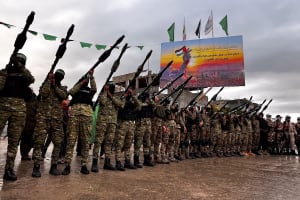Hamas claims it's willing to halt military activities, stop tunnel construction under long-term ceasefire with Israel
Hamas proposal offers temporary ceasefire, group refuses to give up weapons or end armed resistance

The deadlock in the hostage negotiations persists after Hamas rejected the latest Israeli conditions, which included a demand for the terror group to disarm.
However, a recent report in The Times of Israel, suggests that Hamas leadership is still open to pursuing its goals through negotiations.
Hamas has told Arab mediators it is ready to discuss a long-term ceasefire with Israel, during which it will cease all military activity, including weapons development and tunnel digging, according to the report.
The sources say the Hamas proposal is for a comprehensive deal designed to end the war.
Hamas would cede control of the Gaza Strip and transfer the administration of civilian lives to an independent body of Palestinian technocrats, in accordance with the recent Egyptian proposal for Gaza.
Hamas officials even floated the idea of storing its weapons in a secure warehouse as a gesture to ensure the temporary suspension of military operations against Israel. Hamas is open to a ceasefire lasting five, ten, and even 15 years, the sources reported.
The latest proposal represents a temporary, although long-term, ceasefire, often referred to in Arabic as a hudna.
In Islamic jurisprudence, a hudna with unbelievers can be allowed for the purpose of strengthening and resupplying. Hamas’ charter, which calls for the destruction of Israel, would prevent it from agreeing to a true, permanent peace deal with Israel.
However, the sources were clear that the proposal does not include complete disarmament, a condition demanded by Israel and the United States.
Last week, Khalil al-Hayya, the official in charge of the negotiations on behalf of the group, announced the rejection of the Israeli conditions, reiterating its insistence on a comprehensive agreement that includes an end to the war.
“We are ready to negotiate a comprehensive deal – the release of all Israeli prisoners in exchange for an agreed number of Palestinian prisoners, and in exchange for an end to the war and an Israeli withdrawal from the Gaza Strip," al-Hayya said.
He explicitly stated that Hamas would not agree to a partial deal or the demilitarization of the organization as part of a comprehensive deal.
According to Ahmed al-Tanani, director of the Al Orouba Centre for Research and Strategic Studies, talk of disarming Hamas is a direct strike against the identity of the group as a resistance movement aimed at “liberating Palestine.”
He told Qatari news site The New Arab that Hamas could not give up its weapons without being seen to surrender to Israel. He believes Hamas leadership will not even agree to a peace deal that guarantees a Palestinian state in the 1967 borders.
According to the Times of Israel report, the new Hamas proposal would see the release of all Israeli hostages still held by Hamas at one time, in exchange for the release of an agreed upon number of Palestinian prisoners.
Al-Hayya said Hamas also demands a permanent ceasefire, the full withdrawal of the IDF from the entire Gaza Strip, the immediate opening of crossings for the entry of humanitarian aid, and the beginning of the reconstruction of Gaza in accordance with the Egyptian proposal.
Palestinian Islamic Jihad (PIJ) spokesman Muhammad al-Hajj Musa said that his organization also refuses to accept a partial deal with Israel. He said experience shows that Israel views such partial agreements as temporary pauses, rather than as steps towards calm or a permanent settlement.
In an interview with The New Arab, al-Haji Musa said, “In our approach to any deal, what interests us first and foremost is the practical results on the ground, as the main goal of Islamic Jihad is to completely stop the aggression, guarantee security for the residents of the Gaza Strip through the complete withdrawal of IDF forces from the Strip, open the crossings, withdraw IDF forces from the Salah al-Din and Tzarim highways, lift the siege, bring basic supplies to the Strip, and rebuild the Strip.”
On Monday morning, Israel’s Channel 12 reported that Israeli authorities are considering the re-arrest of dozens of released prisoners if the current round of negotiations fails to yield results. The arrests would primarily target individuals released to east Jerusalem and the territories of Judea and Samaria (West Bank).
Over the weekend, the London-based Arab newspaper Rai al-Youm reported that Israel and the United States have informed several Arab countries in the region that they will consider carrying out targeted killings of Hamas leaders living abroad if the group does not release the remaining hostages soon.

The All Israel News Staff is a team of journalists in Israel.
You might also like to read this:
















